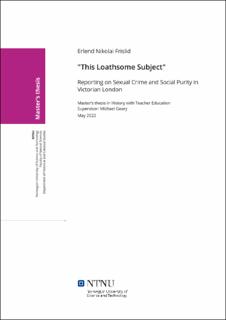"This Loathsome Subject": Reporting on Sexual Crime and Social Purity in Victorian London
Master thesis
Permanent lenke
https://hdl.handle.net/11250/3004235Utgivelsesdato
2022Metadata
Vis full innførselSamlinger
Sammendrag
Denne oppgaven ser på hvordan seksuelle forbrytelser og sosial renslighet ble sett på i perioden 1885 til 1888 i avisene Times og London Evening Standard. I denne perioden var det viktorianske samfunnet preget av vegring for å snakke om og diskutere temaet som var relatert til seksualitet. Det var også en gjennomgående frykt for at samfunnet skulle bli dårligere og dårligere moralsk på grunn av såkalt sosial ondskap.
I 1885 ble «Criminal Law Amendment Act” passert i det britiske parlamentet og større lovmessige beskyttelser ble gitt til jenter og kvinner med tanke på seksuelle forbrytelser, samt at homoseksualitet ble gjort ulovlig. Dette skjedde etter at Pall Mall Gazette lanserte artiklene «Maiden Tribute to Modern Babylon» som sterkt påvirket avisers publisering i ettertid.
I denne oppgaven brukes diskurs analyse for å se på hvordan seksuelle forbrytelser og sosial renslighet ble diskutert i offentligheten. Den identifiserer temaer som respektabilitet, ideologien om to forskjellige sfærer, sensasjonalisme, seksuell regulering, og fokus på juridiske aspekter som sentrale. Oppgaven argumenterer videre for at dette er samsvarende for generelle tendenser i det viktorianske samfunnet på denne tiden og at i hovedsak så er Times og Standard begge representanter for den samme seksjonen av samfunnet. This thesis looks at how sexual crimes and social purity was looked at in the period 1885 to 1888 in the papers Times and London Evening Standard. During this period, Victorian society was characterized by an aversion to discussing sexual topics. People also feared faltering moral standards in British society and the spreading of “social evil” in lower classes. The Criminal Law Amendment Act was passed in parliament in 1885 after Pall Mall Gazette released the “Maiden Tribute of Modern Babylon”. This series of events along with other influences had a profound impact on how newspapers were managed in the time after.
By analyzing a wide range of articles on sexual crime and social purity, this thesis seeks to expand our understanding of the history of sexuality. Newspapers are one of few sources from the Victorian period which tackle a wide range of topics related to sexuality. This is achieved by using discourse analysis to examine newspaper articles and how said topics were discussed in the public sphere. Themes such as respectability, domesticity, sensationalism, sexual regulation and repression, and an abundance of legal commentary are part of what this thesis identifies. It argues that these findings are in line with previous research on the Victorian period and sexuality, and that for most intents and purposes Times and the Standard are part of the same discourses.
